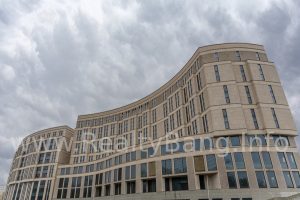Real Estate Investment in Lesotho: The right to individual property is protected under the law. All foreign and domestic private entities can independently establish, acquire and dispose of interests in commercial enterprises.
Under the 2010 Land Act, foreign nationals are allowed to purchase and own land, provided they have at least 20% owned local partners. There is no competition law or overall competition regulator in Lesotho.
Secured interests in both movable and real property are recognized and enforced under the Land Act 2010. The concept of a mortgage exists; The hostages are protected under the Deeds Registry Act 1967.
Intellectual Property Rights
The legal framework for protecting intellectual property rights is relatively strong. Investors complain that enforcement is somewhat weak, although violations and theft are not common. Lesotho regards international intellectual property laws and is a part of the World Intellectual Property Organization (WIPO) as well as the African Intellectual Property Organization.
Intellectual property protection is regulated by the Industrial Property Order of 1989 and the Copyright Act of 1989, which conforms to the standards set out in the Paris Convention and the Berne Convention. The law protects the grant of patents, industrial designs, trademarks, and copyrights, but does not protect trade secrets or semiconductor chip layout designs.
The Law Office is responsible for enforcing the Industrial Property Order, while the Ministry of Tourism, Sports, and Culture is responsible for the enforcement of copyright. The Deeds Registry registers.
Real Estate Investment in Lesotho
Lesotho has a dynamic land tenure system dominated by customary and statutory land tenure systems. Land type rights in Lesotho are leasehold, form C, and title deed. The 2016 Population Household Census Report showed that 16 percent of the population had lease rights; 41 percent had Form C rights, and four percent had title deeds. The registration of the title now takes 11 days, while the 90-year lease is issued in a month.
Supported by the World Bank and the private sector’s competitiveness and economic diversification project, the government has improved the construction permit process by shifting from manual to electronic and automated systems, reducing the time and cost of issuing permits. It takes three to four months to issue building permits and 323 residential building permits were approved by the city’s development control department between January 2018 and December 2018. Rated property in Maseru City is limited to just 8,000 properties, mostly located in them.
Pre-colonial boundaries
The property market is more skewed toward potential buyers in the middle to high-income bracket, except for low incomes, and only a few, mostly middle to high-income people, rely on real estate agents. Unfortunately, the real estate sector is not regulated as there are no laws to guide its operation, and the sector is not officially registered with the Ministry of Public Works nor the Ministry of Local Government and Housing. As a result, property prices often increase in the market, making properties disposed of by real estate agents expensive and inaccessible to most Basothos.
Some estate agents are more prominent than others, such as the Matekan Group of Companies (MGC), which is involved in property development and has so far built 20 three-bedroom luxury homes in the Ampilo Estate. Since 2015, MGC has completed three major construction projects, namely Ampilo Boutique Hotel, MGC Office Park, and Ampilo Estate.
Prices per unit range from M1.8 million (US$104 435) to M2.5 million (US$145 049). Sigma Construction and Property Development have developed low, medium, and high-income residential homes (both detached and enclosed) in Mbote, Khubetsoana, Masowe II, and III. Its housing stock for sale only caters to medium and high incomes and ranges from M650 000 (US$37 712) to M950 000 (US$55 118) for the middle income. It also caters to low income with rentals ranging from M1 800 to M2 500.
Availability of data on housing finance in Real Estate Investment in Lesotho
The lack of housing and housing finance data in Lesotho is a major problem and weakens statistical analysis and weakens the basis for decision-making by the private sector and government. Data often becomes outdated or cannot be sufficiently isolated for useful analysis. The primary sources of housing finance data are:
The Bureau of Statistics (BOS) in the Ministry of Planning collects national data on various sectors but does not collect classified data specifically on housing finance. The data available from the BOS is census information classified according to a specific purpose and is sometimes shared publicly on the website.
The Central Bank of Lesotho, Africa also collects data related to the registration and control of the financial sector.
Standard Lesotho Bank, FNB Lesotho, and Nedbank Lesotho store data but these are not always in the public domain.
The Land Administration Authority keeps records as it registers all land transactions, including bonds and collateral. Data is available upon request.
Housing supply
The National Housing Policy estimates that a total of 98 711 houses will need to be built by 2025 to meet the housing demand in Lesotho. The 2015 Lesotho Housing Profile Report estimates that 5 195 dwellings or 8 932 rooms will be needed to meet urban housing demand in a year.
The urbanization rate in 2019 was 2.33 percent, while the national household average size is estimated at 4.8 persons for rural areas and 3.4 persons for urban areas. Housing for the poor is mainly located on the periphery where land and rent are relatively cheap. The private rental housing stock accounts for 50 percent of the urban housing stock and accommodates about 52 percent of households renting single-row homes in urban areas.
The housing delivery system is primarily through homeownership that is financially sponsored by individuals and through employment-linked housing rents for civil service employees. The government of Lesotho provides housing quarters to its civil servants but does not provide any direct housing subsidy. Formal private sector housing supply is concentrated at the top of the market, leaving most people with no choice but informal housing. This is evidenced by the data collected on the number of new homes completed in the city of Maseru in 2018, which were 326 approved building permits.
There was a booming market for private housing development, including a proposal by a company registered as Morero City Development to start a satellite town housing development in partnership with Maseru City Council. According to the Morero City Development Report, Sustainable Infrastructure for a Better Future, this new housing project aims to develop a mixed-use development in the southwest of Maseru, 5 km from the Maseru city center. According to the four-year plan, the project will cover 400 hectares of land for residential units; office space; Education facilities; A proximity retail complex; a hotel; and other buildings such as civic centers and sports facilities.
Another housing delivery agent in Lesotho is Habitat for Humanity Lesotho (HFHL), which works in combination with exposed groups including orphans and vulnerable children, the elderly, and people with disabilities. So far, around 3,000 families have received various housing solutions. Between July 2017 and June 2019, 100 two-room houses with pit toilets were built for vulnerable households. Most homes provided under HFHL are 100% subsidized by donors, making HFHL the only non-governmental organization currently operating in the housing sector in Lesotho.
Know the complete information about Real Estate Investment in Lesotho at https://www.lesothohousing.org.ls/




